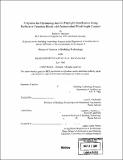A system for optimizing interior daylight distribution using reflective Venetian blinds with independent blind angle control
Author(s)
McGuire, Molly E
DownloadFull printable version (12.82Mb)
Other Contributors
Massachusetts Institute of Technology. Dept. of Architecture.
Advisor
Leon R. Glicksman and Marilyne Anderson.
Terms of use
Metadata
Show full item recordAbstract
An operational algorithm for blind angle control is developed to optimize the daylighting performance of a system of reflective Venetian blinds. Numerical modeling and experiment confirm that independent control of alternating blinds yields adequate visual comfort and daylight distribution to a distance of 10 m from the window under most clear sunny and overcast sky types. Under overcast sky conditions, all blinds are set to a uniform angle which optimizes light redirection to 10 m. For cases of direct solar incidence, alternating blinds are used for shading and light redirection and adjusted with changing solar position. For low solar angles, a set of blind angle configurations is developed utilizing blind-blind reflections to maximize light penetration.
Description
Thesis (S.M.)--Massachusetts Institute of Technology, Dept. of Architecture, 2005. Includes bibliographical references (p. 94-96).
Date issued
2005Department
Massachusetts Institute of Technology. Department of ArchitecturePublisher
Massachusetts Institute of Technology
Keywords
Architecture.